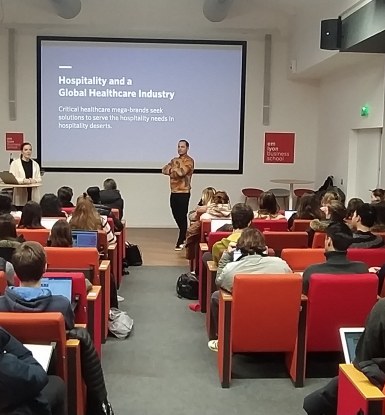Melanie Araneda is from Guatemala, a country south of Mexico and home to volcanoes, rainforests and ancient Mayan sites. She is now studying in France, pursuing her Master of Science in Health Management and Data Intelligence at emlyon business school.
The 27-year old Latin American’s background is in dentistry, but the more she looked for ways to upskill, the more drawn she was towards business. Data management, in particular, could really fill the gap and propel the healthcare industry forward. “I knew I was lacking this knowledge. I started getting curious and looking for courses on the side but finally decided I wanted to do a Masters in Business but linked to health,” she tells us in an interview.
We caught up with her via email to find out what’s she learning in classes today, what Read more below on what she has to say about her studies, France, and advice:
Tell us more about studying in France, why choose to pursue your Master Of Science in Health Management and Data Intelligence at emlyon business school?
The curriculum in this course covered all the topics I was interested in. Taking into consideration emlyon high-ranking as a business school, I knew that studying in France was meant for me as it would give me the skills and tools I was looking for. Being able to experience the French culture which I’ve also always been very curious about. In addition, studying a trimester in their Shanghai Campus also was of great interest to me as both a cultural and professional experience.
Do you think it would have made a difference if you studied at a local institution?
My personal plans involve being able to work in an international company. If I had studied at a local institution, I probably wouldn’t have had a truly international experience.
What has been your most memorable class so far — and why?
Studying in France, all of my classes involve data management and the implementation of health information systems, which have been really eye-opening. It’s also given me a different perspective of the healthcare industry that I wasn’t very familiar with.
Have you made any fond memories?
All of my teachers have been super supportive, taking into consideration the different backgrounds my classmates and I have. They have taken the time to make sure we are all engaged and able to get the most out of each subject. We have also had lecturers from various important international companies. In turn, it’s given us valuable insight into the current market and helped us with our current projects.
What are the practical learning elements in your master’s degree?
We have many group projects which require us to apply not only all the theory we learn, but also the teamwork skills. The latter is tremendously important. We also have bootcamps, such as for Python, which helped us gain knowledge on real-world data processing.
What are your academic goals? What skills have you gained thus far?
Honestly, every skill learned in this master’s degree has been new to me. Coming from a very specific background like dentistry, studying in France has really led me to learn about a large scope of subjects in business and data.
What do you plan to do with this degree after graduating?
I believe after studying in France, this degree will open up a number of possible markets I could work in. For the moment, I am interested in medical imaging processing, and also project management among software developers and healthcare providers.
What is one thing from home you miss?
I mainly miss my family and sometimes the local food and traditional dishes from back home. I have been able to make several close friends from different countries, whom I know will be lifelong friends once my studies here are over. As for the food, well French cuisine will excite me enough until I am able to return home.
What advice do you have for international students looking to enrol in the same course as yourself?
Go with an open mind, you will meet people from so many cultures and professional backgrounds, that any casual conversation can be a great learning opportunity. Always be certain you have something to bring to the table, even though you come from a small or lesser-known country.


